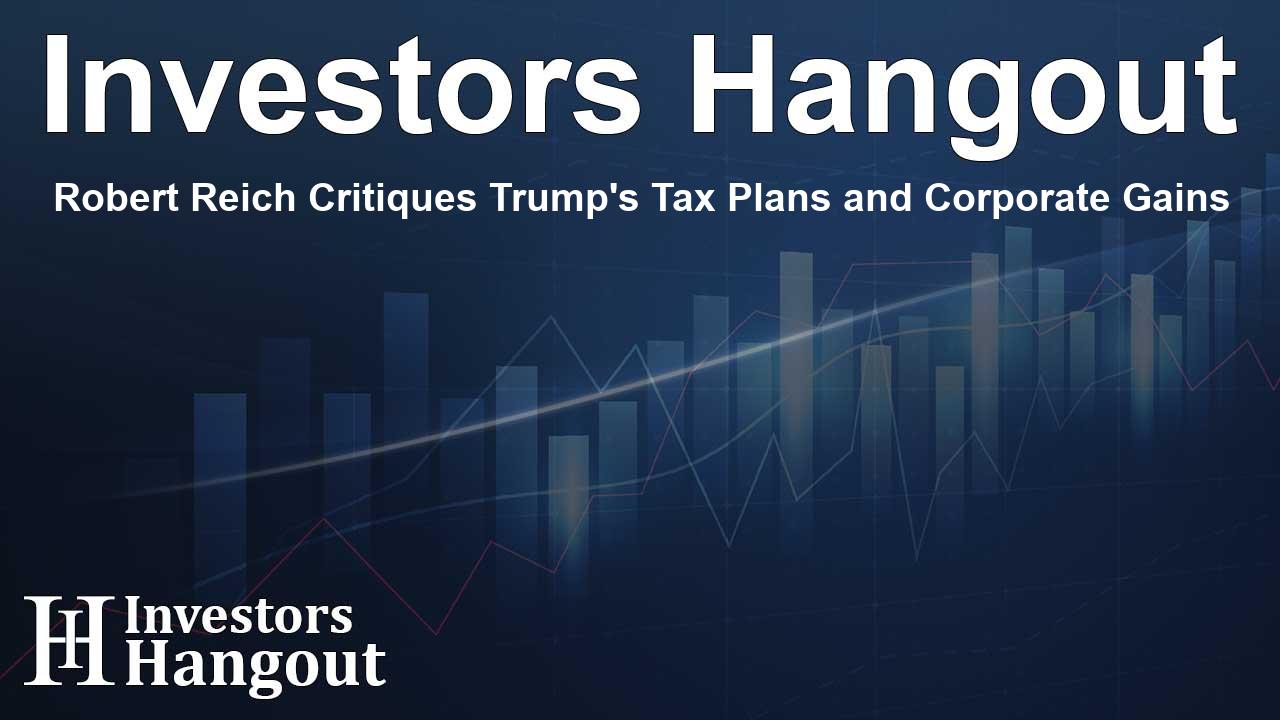Robert Reich Critiques Trump's Tax Plans and Corporate Gains

Robert Reich's Perspective on Proposed Tax Cuts
Renowned economist and former U.S. Secretary of Labor Robert Reich has voiced strong concerns regarding the tax reduction proposals from the administration led by Donald Trump. In a recent statement, Reich described the intended cuts as "an absolutely shameless giveaway" that could potentially escalate the federal deficit by a staggering $4.6 trillion.
Understanding the Implications of Tax Cuts
The proposed tax cuts favor affluent individuals while also reducing corporate tax rates. These changes, according to Reich, are likely to exacerbate the U.S. trade deficit. The administration appears set to finance these significant tax reductions through tariffs imposed on trade partners.
Impact on Major Corporations
The Center for American Progress Action Fund (CAPAF) has provided data highlighting how lowering corporate tax rates to 15% could yield billions in savings across various sectors. A notable projection is that the top 100 U.S. companies will benefit from a substantial $48 billion in total annual tax reductions, all while reporting a massive $1.1 trillion in profits.
Sector-Wise Financial Breakdown
Breaking down the anticipated tax relief reveals considerable financial gains concentrated within specific industries:
Top 10 U.S. Companies
The wealthiest firms, which reported combined profits exceeding $520 billion, are set to enjoy approximately $23 billion in annual tax reductions. This group includes prominent players such as Meta Platforms Inc. (NASDAQ: META), Comcast Corp. (NASDAQ: CMCSA), and JPMorgan Chase & Co. (NYSE: JPM).
Oil Industry Gains
Notably, the five largest U.S. oil corporations, including Exxon Mobil Corp. (NYSE: XOM) and Chevron Corp. (NYSE: CVX), will see an estimated $2.2 billion annual tax cut. This benefit comes despite these firms collectively accruing more than $80 billion in profits.
Pharmaceutical Sector
The pharmaceutical giants, such as Johnson & Johnson (NYSE: JNJ) and Pfizer Inc. (NYSE: PFE), are projected to receive a combined tax relief of approximately $3.1 billion annually, despite their substantial profits exceeding $50 billion.
Financial Services
The top five Wall Street banks, including JPMorgan Chase and Bank of America Corp. (NYSE: BAC), will gain around $4.1 billion in tax cuts, even after reporting profits nearing $113 billion.
Grocery Sector Benefits
The largest grocery chain operators, such as Kroger Co. (NYSE: KR) and Walmart Inc. (NYSE: WMT), stand to benefit from approximately $1.7 billion in tax relief, amid overall profits surpassing $29 billion.
What This Means Moving Forward
Reich emphasizes the importance of understanding the broader implications of such tax policies. He points out risks associated with increasing reliance on tariffs to counterbalance the significant tax cuts being introduced. The administration has already initiated various tariffs, notably a 25% duty on steel and aluminum imports, leading to tensions with trade partners.
The Economic Climate under Trump’s Policies
Experts, including macro strategist Craig Shapiro from the Bear Traps Report, have commented on the strategies proposed to fund these tax cuts. According to Shapiro, tariffs may emerge as the feasible path to sustain these cuts without amplifying the federal deficit. This has led to a prevailing sense of uncertainty among businesses regarding the economy's direction.
Investor Sentiment and Market Reaction
The dynamics surrounding stock markets reflect an ongoing caution. The SPDR S&P 500 ETF Trust (NYSE: SPY) and Invesco QQQ Trust ETF (NASDAQ: QQQ) displayed mixed performance recently, signaling the impact of these economic policies on investor sentiment.
Frequently Asked Questions
What are the main concerns raised by Robert Reich about the tax cuts?
Robert Reich has expressed that the proposed tax cuts could result in a $4.6 trillion increase in the deficit while favoring wealthy individuals and corporations.
How much in tax cuts are the top U.S. companies expected to receive?
The top 100 U.S. companies are anticipated to receive a total of $48 billion in annual tax cuts.
Which industries are expected to benefit the most from these tax cuts?
Industries such as oil, pharmaceuticals, and banking are expected to receive significant tax reductions alongside grocery chains.
How might tariffs be used to fund these tax cuts?
The administration is likely to impose tariffs on trade partners as a means to finance the tax cuts without increasing the deficit.
What does the market reaction indicate about investor sentiment?
The mixed performance of major ETFs like SPY and QQQ suggests ongoing caution and uncertainty among investors regarding the economic landscape.
About The Author
Contact Evelyn Baker privately here. Or send an email with ATTN: Evelyn Baker as the subject to contact@investorshangout.com.
About Investors Hangout
Investors Hangout is a leading online stock forum for financial discussion and learning, offering a wide range of free tools and resources. It draws in traders of all levels, who exchange market knowledge, investigate trading tactics, and keep an eye on industry developments in real time. Featuring financial articles, stock message boards, quotes, charts, company profiles, and live news updates. Through cooperative learning and a wealth of informational resources, it helps users from novices creating their first portfolios to experts honing their techniques. Join Investors Hangout today: https://investorshangout.com/
The content of this article is based on factual, publicly available information and does not represent legal, financial, or investment advice. Investors Hangout does not offer financial advice, and the author is not a licensed financial advisor. Consult a qualified advisor before making any financial or investment decisions based on this article. This article should not be considered advice to purchase, sell, or hold any securities or other investments. If any of the material provided here is inaccurate, please contact us for corrections.
